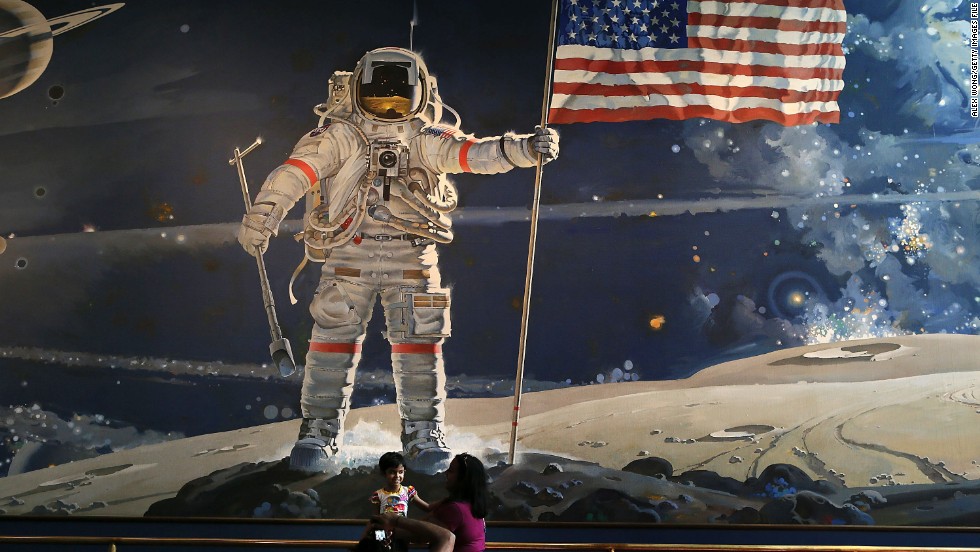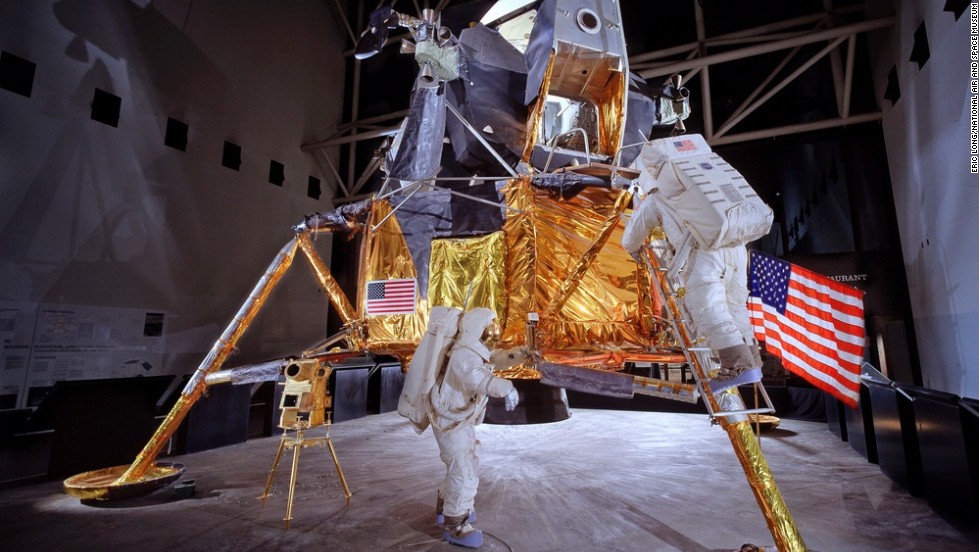(CNN)Here's a look at the first moon landing on July 20, 1969. The moon landing was watched by an estimated 600 million people around the world.
Facts
July 20, 1969 - [4:17 p.m. EDT] Apollo 11 becomes the first manned spacecraft to land on the moon.
Neil Armstrong (commander), Buzz Aldrin (lunar module pilot) and Michael Collins (command module pilot) were the crew.
The Apollo 11 spacecraft consisted of the command module, Columbia, and the lunar module, Eagle.
The crew traveled 240,000 miles from the Earth to the moon in 76 hours.
ABC, CBS and NBC spent, collectively, between $11 million and $12 million on Apollo 11 coverage and covered the mission from Sunday morning until Monday evening.
Timeline
May 25, 1961 - President John F. Kennedy addresses Congress, "First, I believe that this nation should commit itself to achieving the goal, before this decade is out, of landing a man on the moon and returning him safely to the earth. No single space project in this period will be more impressive to mankind or more important for the long-range exploration of space; and none will be so difficult or expensive to accomplish."
November 21, 1962 - President Kennedy tells NASA Administrator James Webb, "This is, whether we like it or not, a race. Everything we do [in space] ought to be tied into getting to the moon ahead of the Russians."
May 18, 1969 - Apollo 10 lifts off from Kennedy Space Center, Florida. This launch is a dress rehearsal for Apollo 11. The crew, Thomas Stafford, John Young, and Eugene Cernan, orbit the moon and then return to earth eight days, three minutes and three seconds later.
July 16, 1969 - At 9:32 a.m. EDT Apollo 11 lifts off from Pad A, Launch Complex 39, Kennedy Space Center, Florida.
July 20, 1969 - At 1:47 p.m. EDT Armstrong and Aldrin, in the lunar module Eagle, separate from the command module. Collins remains onboard the Columbia orbiting the moon.
- 4:17 p.m. EDT - The Eagle lands.
- 4:18 p.m. EDT - "Houston, Tranquility Base here. The Eagle has landed," Armstrong reports. When the lunar module lands on the moon's surface at the Sea of Tranquility, it has less than 40 seconds of fuel left.
- 10:56 p.m. EDT - Armstrong says, "That's one small step for man, one giant leap for mankind," as he becomes the first human to set foot on the moon.
- 11:15 p.m. EDT (approx.) - Buzz Aldrin joins Armstrong on the moon. The men read from a plaque signed by the three crew members and the president, "Here men from the planet Earth first set foot upon the Moon, July 1969 A.D. We came in peace for all mankind."
- 11:48 p.m. EDT - President Nixon speaks to Armstrong and Aldrin via radio from the Oval Office, "(it) certainly has to be the most historic telephone call ever made." They speak for two minutes and the call is televised on both ends.
- Armstrong and Aldrin spend over two hours collecting moon rock samples and data, and spend the night on board the Eagle.
- 4:17 p.m. EDT - The Eagle lands.
- 4:18 p.m. EDT - "Houston, Tranquility Base here. The Eagle has landed," Armstrong reports. When the lunar module lands on the moon's surface at the Sea of Tranquility, it has less than 40 seconds of fuel left.
- 10:56 p.m. EDT - Armstrong says, "That's one small step for man, one giant leap for mankind," as he becomes the first human to set foot on the moon.
- 11:15 p.m. EDT (approx.) - Buzz Aldrin joins Armstrong on the moon. The men read from a plaque signed by the three crew members and the president, "Here men from the planet Earth first set foot upon the Moon, July 1969 A.D. We came in peace for all mankind."
- 11:48 p.m. EDT - President Nixon speaks to Armstrong and Aldrin via radio from the Oval Office, "(it) certainly has to be the most historic telephone call ever made." They speak for two minutes and the call is televised on both ends.
- Armstrong and Aldrin spend over two hours collecting moon rock samples and data, and spend the night on board the Eagle.
July 21, 1969 - At 1:54 p.m. EDT - The Eagle departs from the moon to rendezvous with Columbia.
- 5:35 p.m. EDT - The Eagle docks with Columbia. After transferring moon rocks, data, and equipment, the Eagle is jettisoned, and the crew begins the flight back to Earth.
- 5:35 p.m. EDT - The Eagle docks with Columbia. After transferring moon rocks, data, and equipment, the Eagle is jettisoned, and the crew begins the flight back to Earth.
July 22, 1969 - Columbia reaches a trajectory toward Earth.
July 24, 1969 - At 12:50 p.m. EDT Columbia splashes down, eight days, three hours and 18 minutes after liftoff. The astronauts return to Earth in the Pacific Ocean about 900 miles from Hawaii, then go into quarantine aboard the USS Hornet.
August 10, 1969 - The astronauts are released from quarantine.
July 9, 2019 - The Smithsonian's National Air and Space Museum in partnership with the US Department of the Interior and 59 Productions announces a celebration of the 50th anniversary of the first moon landing July 16 through July 20. Included in the presentation "Apollo 50: Go for the Moon," will be a full-sized projection on the east side of the Washington Monument for three nights July 16 through July 18 of the Saturn V rocket that sent Apollo 11 into orbit.

























